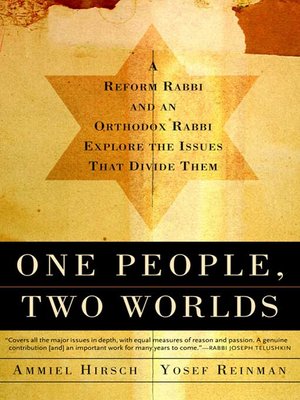One People, Two Worlds
ebook ∣ A Reform Rabbi and an Orthodox Rabbi Explore the Issues That Divide Them
By Ammiel Hirsch

Sign up to save your library
With an OverDrive account, you can save your favorite libraries for at-a-glance information about availability. Find out more about OverDrive accounts.
Find this title in Libby, the library reading app by OverDrive.



Search for a digital library with this title
Title found at these libraries:
| Library Name | Distance |
|---|---|
| Loading... |
For Jews and non-Jews: An honest, intelligent, no-holds-barred discussion of virtually every “hot button” issue on which Reform and Orthodox Jews differ.
After being introduced by a mutual friend in the winter of 2000, Reform Rabbi Ammiel Hirsch and Orthodox Rabbi Yosef Reinman embarked on an unprecedented eighteen-month email correspondence on the fundamental principles of Jewish faith and practice. What resulted is this book: among the discussions the existence of a Supreme Being, the origins and authenticity of the Bible and the Oral Law, the role of women, assimilation, the value of secular culture, and Israel.
Sometimes they agree; more often than not they disagree—and quite sharply, too. But the important thing is that, as they keep talking to each other, they discover that they actually like each other, and, above all, they respect each other. Their journey from mutual suspicion to mutual regard is an extraordinary one; from it, both Jews and non-Jews of all backgrounds can learn a great deal about the practice of Judaism today and about the continuity of the Jewish people into the future.
After being introduced by a mutual friend in the winter of 2000, Reform Rabbi Ammiel Hirsch and Orthodox Rabbi Yosef Reinman embarked on an unprecedented eighteen-month email correspondence on the fundamental principles of Jewish faith and practice. What resulted is this book: among the discussions the existence of a Supreme Being, the origins and authenticity of the Bible and the Oral Law, the role of women, assimilation, the value of secular culture, and Israel.
Sometimes they agree; more often than not they disagree—and quite sharply, too. But the important thing is that, as they keep talking to each other, they discover that they actually like each other, and, above all, they respect each other. Their journey from mutual suspicion to mutual regard is an extraordinary one; from it, both Jews and non-Jews of all backgrounds can learn a great deal about the practice of Judaism today and about the continuity of the Jewish people into the future.







